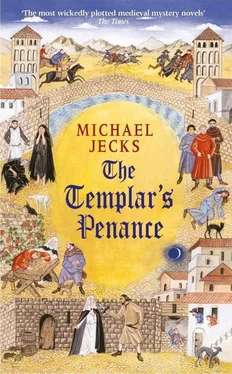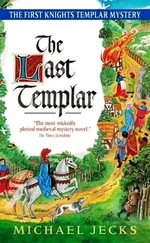Michael Jecks - The Templar
Здесь есть возможность читать онлайн «Michael Jecks - The Templar» весь текст электронной книги совершенно бесплатно (целиком полную версию без сокращений). В некоторых случаях можно слушать аудио, скачать через торрент в формате fb2 и присутствует краткое содержание. Год выпуска: 2014, ISBN: 2014, Издательство: Headline, Жанр: Исторический детектив, на английском языке. Описание произведения, (предисловие) а так же отзывы посетителей доступны на портале библиотеки ЛибКат.
- Название:The Templar
- Автор:
- Издательство:Headline
- Жанр:
- Год:2014
- ISBN:9781472219763
- Рейтинг книги:4 / 5. Голосов: 1
-
Избранное:Добавить в избранное
- Отзывы:
-
Ваша оценка:
- 80
- 1
- 2
- 3
- 4
- 5
The Templar: краткое содержание, описание и аннотация
Предлагаем к чтению аннотацию, описание, краткое содержание или предисловие (зависит от того, что написал сам автор книги «The Templar»). Если вы не нашли необходимую информацию о книге — напишите в комментариях, мы постараемся отыскать её.
The Templar — читать онлайн бесплатно полную книгу (весь текст) целиком
Ниже представлен текст книги, разбитый по страницам. Система сохранения места последней прочитанной страницы, позволяет с удобством читать онлайн бесплатно книгу «The Templar», без необходимости каждый раз заново искать на чём Вы остановились. Поставьте закладку, и сможете в любой момент перейти на страницу, на которой закончили чтение.
Интервал:
Закладка:
They left and walked farther up the lane. The next two stables were no more helpful than the first, but when they reached the fourth one, the little, pinched-faced man took Baldwin’s money with a suspicious glower. Simon thought it made him look less like a human and more like a deeply unhappy goblin, similar to the ones being carved on Exeter’s new Cathedral.
Baldwin asked whether a knight had called in yesterday afternoon, and the man nodded suspiciously. ‘What of it?’
‘We wanted to ask about his horse. He had it for much of the afternoon?’
‘If he’s the man you mean, he took it out in the early afternoon. I told him to be careful, because of the heat, and he said he was going up along the river so the horse could drink and get shade when it wanted.’
‘I see. And which horse did he take?’ Baldwin asked glancing along the lines of mounts.
‘His own. A dark one, with a splash of white on its shoulder and neck. Why?’
Baldwin tried to control his excitement. ‘This man, he came back later? Where is the horse now?’
‘He’s taken it with him — off to Portugal, I think. Probably to Tomar. That was where he was talking about going, anyway.’
Baldwin rapped out some more questions, then turned at last to Simon. ‘He says that the man’s name was Ramon.’
‘He’s bolted! He’s taken the money and gone!’
‘Slow down, Simon. He could merely have been so distraught at his fiancee’s death that he decided to flee the city. It is, after all, in Compostela, where his dreams came to nought.’
‘Did he say he would return?’ Simon enquired.
‘No. He has gone to Portugal, this man thinks.’
Simon licked his lips. ‘Ask about other travellers who have come in here recently and stabled their horses with him.’
After much talk, the groom admitted to some others. One in particular was a handsome mare which had arrived the day before. A man with a badly hunched back had brought it in, and left it. He hadn’t said when he was going to want it. It was just down the second aisle.
The groom led the way between massive rumps of horseflesh to a pretty little amblere, which stood sedately cropping at a bundle of hay, eyeing the men curiously.
‘Very pretty,’ Baldwin said with a smile, patting her backside.
‘She’d be a lovely beast for a lady,’ the groom said innocently.
‘I am sure you are right,’ Baldwin agreed affably. ‘Tell me more about this man who brought it in to you.’
Munio was in his hall with his clerical secretary when the call came to him, and he sighed as the priest packed up his scrip and some parchments with the air of a man who had seen it all before and knew he would see many more deaths before his own.
Every year, five or six men were elected to the post of Enquirer in Compostela, but Munio would be happy when his own period of office was complete. Usually, he spent his time in arranging sales of the strong local wines, for he was a merchant of some repute, but this last year had been difficult because he had been busy with investigations.
It was a dolorous task, observing the results of crimes, enquiring of the victims what they had seen, how they had been treated. All too often they would be shaking, scared, injured, with blood seeping from filthy rags bound about knocked heads, or over the stumps of fingers where they had tried to deflect a blade. And all too often they were dead, like the poor girl yesterday.
Death was the most depressing part of it all. It was not unnatural to be upset by the death of a young woman, but Munio felt the same sadness whether it was a child, a youth or an old person. His mournfulness had increased greatly since he became Pesquisidor . There was no sense in the early death of a fellow before his time. Or her time.
All were used to the misery of loss. No one could have escaped it, especially after the dreadful famines which affected the whole of Castile in the years from 1301. He had heard that other places had suffered too, especially since 1316, but the loss of so many in his own town was enough woe for him. There was only so much sadness a man could cope with.
There had been good times, it was true. He had fallen in love, he had married, fathered a pair of boys who were even now apprenticed to a friend who would teach them discipline and the rudiments of business, and his wife Margarita was a loyal, sensible, contented woman, who was a source of delight to him, and a continual relief. Without her, he would never have been able to cope with the stress of the last few months looking into so many crimes.
It was hard to believe that so many people who were only here to show their religious convictions or to beg forgiveness for a crime could cause so much mayhem, but that was the case.
And now there had been another murder.
He followed the young man who had found the corpse, and stood over the bundle of filthy clothes, his nose twitching at the metallic smell of blood. It repelled him as ever.
‘Who would want to kill an old chap like him?’ he wondered aloud.
‘There was another beggar here. She screamed when he fell,’ the lad said. He was a short fellow, with the crooked leg that spoke of rickets when he had been a child. His pale, shocked features were pox-marked and scrawny, as though he hadn’t had a filling meal in weeks.
‘Where is she?’ Munio asked.
‘Dunno. I heard her scream, and saw this man fall, and then she ran off. The murderer must have stabbed the old sod and then bolted back down that way,’ he said, pointing back towards the square.
‘Did you see who the beggarwoman was?’
‘I’ve seen her, yes, but I don’t know her name.’
‘Oh, good!’ Munio sighed with weary acceptance. In his experience, people who thought that they recognised someone near a crime, whether it was a witness or the perpetrator, were invariably wrong. In the heat of the moment, they always seemed to impose their own bigotries or hatreds on the scene and, in short, saw what they expected to see. It was rare that he had learned much of any use from ‘witnesses’ to a crime — except where the criminal was caught red-handed.
Usually, of course, that was what happened, he reflected as he hunkered down beside Matthew’s body. The man who killed was there, tripped over or grabbed by passers-by, and held until the Pesquisidor arrived. Normally, there was the smell of old wine on the man’s breath and he confessed bitterly, his motive some imagined slight or insult in a tavern, or some ancient feud reignited by alcohol.
This was not that kind of death, surely. ‘You say she screamed when this man fell, and then the killer approached him?’
‘Yes.’
‘So he was already on the ground before the man reached him?’ Munio said, brows raised. ‘The killer saw him fall to the ground, and then stabbed him?’
That he had been stabbed was not in question. There was a sharply cut section of material in the front of his breast, a little to the side of the breastbone. The knife must have been thrust in forcefully and it had penetrated the heart instantly so far as Munio could see, because there was little blood. When he lifted the robes and pulled the shirt aside, there were no other stab wounds that he could see. The old man’s thin ribcage stood out plainly, the ghastly slit where the blade had penetrated showing as a dark cut with a dribble of blood.
It was a miserable figure, this corpse. At least the woman yesterday had been fully fleshed. This man was skinny, each bone defined. His chin was covered in a grey stubble as though he hadn’t been shaved in a week or more, although he was proud enough not to want to remain unshaved. Most beggars accepted their status and grew long beards. Not this fellow.
Читать дальшеИнтервал:
Закладка:
Похожие книги на «The Templar»
Представляем Вашему вниманию похожие книги на «The Templar» списком для выбора. Мы отобрали схожую по названию и смыслу литературу в надежде предоставить читателям больше вариантов отыскать новые, интересные, ещё непрочитанные произведения.
Обсуждение, отзывы о книге «The Templar» и просто собственные мнения читателей. Оставьте ваши комментарии, напишите, что Вы думаете о произведении, его смысле или главных героях. Укажите что конкретно понравилось, а что нет, и почему Вы так считаете.












